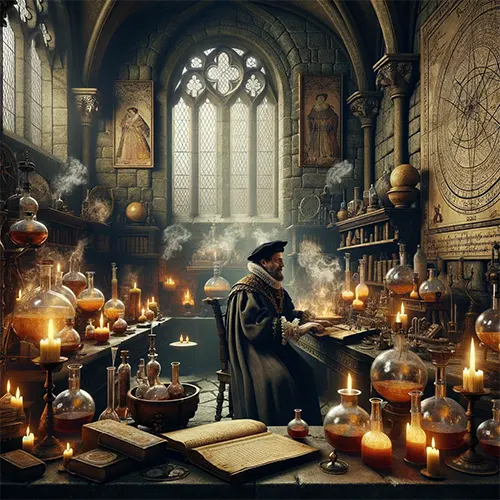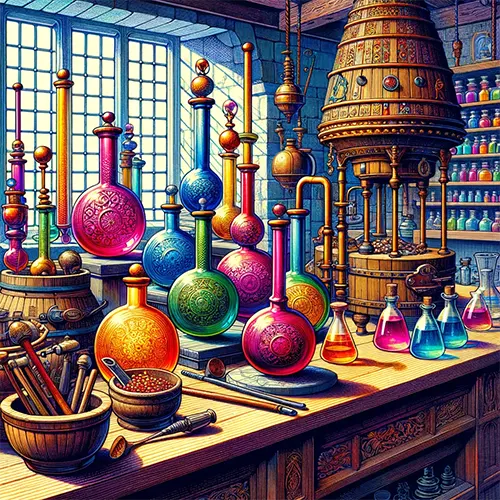
Unlock the secrets of Tudor alchemy, a blend of science, magic, and mystery. This article takes you on a journey through the alchemical labs of the past, exploring the tools, philosophies, and materials used by alchemists in their quest to turn ordinary metals into gold. Discover whether they succeeded and the status they held in society.
The Alchemy Obsession in the Middle Ages
Imagine a world where the impossible seems within reach, where gold, the symbol of riches and power, could be crafted from the everyday items. This was the dream of alchemy, a fascinating blend of early chemistry, philosophy, and mysticism that captivated the Tudor era. But alchemy was more than a mere quest for wealth; it was a pursuit of knowledge, an attempt to understand the mysteries of the universe.
The Science and the Magic
At the heart of alchemy lies the Magnum Opus, the great work of turning base metals into precious gold. Yet, for Tudor alchemists, this was no simple experiment. It was a spiritual journey, reflecting the transformation of the self. Alchemists combined elements, heated and mixed substances, always in search of the elusive philosopher’s stone, believed to possess the power to achieve this transmutation and grant eternal life.
Tudor Alchemists: The Seekers of Secrets
The Tudor period, with its mix of enlightenment and superstition, was a golden age for alchemy. Figures like John Dee, a polymath and advisor to Queen Elizabeth I, embodied the alchemist’s dual role as scientist and mystic. Dee’s work in alchemy was not merely for personal gain but was entwined with his efforts to strengthen the realm and expand its knowledge.
Tools of the Trade

Tudor alchemists were like the scientists of their day, equipped with an array of fascinating tools:
- Crucibles and Alembics: Used for heating substances to very high temperatures.
- Retorts: Glassware for distilling liquids.
- Mortar and Pestle: For grinding and mixing ingredients.
- Athanoor: A slow-burning furnace that provided a constant heat.
These tools were the alchemists’ companions in their experiments, each playing a crucial role in the quest for the philosopher’s stone, a mythical substance believed to turn metals into gold.
The Philosophy Behind the Magic
Alchemy wasn’t just about getting rich quick. It was deeply philosophical, intertwining with the alchemist’s spiritual journey. They believed in the four elements (fire, water, air, earth) and that all metals grew in the earth and could be perfected. To them, turning lead into gold symbolised achieving ultimate knowledge and perfection.
Did They Succeed?
Here’s the million-dollar question: Did Tudor alchemists actually turn metal into gold? The short answer is no, not in the way they hoped. But their experiments laid the groundwork for modern chemistry, teaching us valuable lessons about how substances interact.
Materials of Mystery
Alchemists used a variety of materials in their experiments:
- Base Metals: Like lead, which they hoped to turn into gold.
- Herbs and Minerals: Believed to have magical properties.
- Mercury and Sulfur: Essential ingredients in many alchemical recipes.
Status in Society
Alchemy was a respected practice in Tudor times, and alchemists often enjoyed the patronage of royalty. Figures like John Dee were advisors to the queen and held in high esteem. However, not everyone was successful, and some were even considered charlatans.
The Legacy of Alchemy
While Tudor alchemists may not have turned lead into gold, their adventurous spirit and relentless pursuit of knowledge have left a lasting legacy. Their work paved the way for modern science, showing us the value of curiosity and the endless quest for understanding the world around us.
Are you fascinated by the intersection of history, science, and magic? Subscribe to delve deeper into the mysteries of the past and uncover more tales of the Tudors and their timeless quest for knowledge.
Links to more information
- The mystical Artefacts of John Dee at the British Museum.
- British Museum: A medieval alchemical book reveals new secrets
- The Science History Institute: Provides detailed articles on the history of alchemy and its evolution into chemistry.
- The Royal Society of Chemistry: What is Alchemy?

